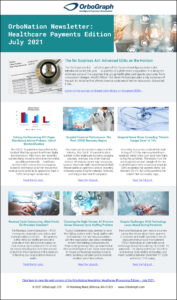Healthcare Revenue Cycle Management
Managing a pandemic was and is a challenge in any industry. Medical Economics recently examined the pressure COVID-19 put on medical practices and their administrative staff. Before COVID-19 struck, many healthcare providers were already nearing a breaking point from the stress of their jobs. Faced with a number of demands – evolving laws, regulations and standards; healthcare reform and changing payment policies; too many administrative tasks; balancing increased patient expectations as healthcare consumers with limited time for patient interactions – providers and their staff were already suffering burnout at record levels.
Read MoreOver the past year, our R&D team has delivered many enhancements to our OrboAccess and our Healthcare Payments Automation Center (HPAC) technology. One of the major enhancements offers the ability for users/clients to custom categorize correspondence letters — improving the efficiency of working denials.
Read MoreIn case you missed it, over the past month, we have published incredible content on our OrboNation Blog and Modernizing RCM with AI. Review the latest OrboNation Newsletter online or via PDF download.
Read MoreThe problem, to be specific, is unexpected bills and the ability of patients — now responsible for so much more out-of-pocket medical expenses — to pay. Physicians are finding themselves with a pile of unpaid bills that is growing by the month. To begin attacking this challenge, Mr. Colabella suggests “front-loading” expectations as much as…
Read MoreSome of the adjustments we’ve made in the era of COVID-19 have become familiar. It’s hard to imagine at this point, for instance, that there was a time when we didn’t know what a ZOOM call was. In fact, it’s now a fairly ubiquitous executive conceit to “prep” the home-office (or rec room) background when…
Read MoreSheetal Nariani is an expert on blockchain technology who has worked for over a decade in the financial management sector within the healthcare and pharmaceutical industry, including pharmaceutical giants like Cipla and Novartis, and has advised multiple renowned companies in the healthcare and pharmaceutical sector on how to plan, develop, and execute their financial strategies.
Read MoreWe’ve reported recently on the No Surprises Act and the necessity for taking steps to prepare for the resultant advanced EOBs. This is advice that nears repeating, as the deadline for implementation approaches. The Kaiser Family Foundation has a comprehensive overview of the No Surprises Act available here.
Read MoreIn case you missed it, over the past month, we have published incredible content on our OrboNation Blog and Modernizing RCM with AI. Review the latest OrboNation Newsletter online or via PDF download.
Read MoreTucson Gastroenterology seemed to have their billing system well in hand, staffed with professionals that had long association with the organization and deep knowledge of their methodology and procedures. What could go wrong? Well, as examined at RevCycleIntelligence, those experienced in-house professionals eventually had to retire, handing a complex (and somewhat intuitive) set of instructions…
Read MoreThe No Surprises Act — which is part of the Consolidated Appropriations Act introduced earlier this year — is a pretty straightforward proposition: It is designed eliminate some of the surprises that group health plan participants encounter from unexpected charges. Health Affairs This Week Podcast provides a tidy summary of the act. An initiative that affects revenue cycle needs further discussion : Advanced EOBs.
Read More






